May 21, 2025 | 09:10 GMT +7
May 21, 2025 | 09:10 GMT +7
Hotline: 0913.378.918
May 21, 2025 | 09:10 GMT +7
Hotline: 0913.378.918
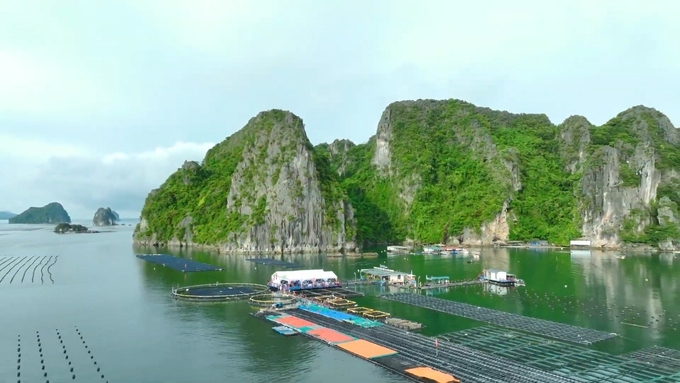
The oyster - seaweed intercropping model in Van Don district, jointly invested by STP Group. Photo: Van Nguyen.
In addition to tourism, aquaculture specifically mollusk farming is currently the main income for people in Van Don district, Quang Ninh province. This locality orients developing sustainable oyster farming in parallel with environmental protection.
The aquaculture model in Ha Long commune, Van Don district has an infrastructure system entirely made of environment-friendly high density polyethylene (HDPE) material. The model is spread over an area of approximately 5 ha, including 1 ha of oysters and 4 ha of elkhorn sea moss intercropped. It is known that this model is a chain cooperation between STP Group and Phat Co Cooperative led by Nguyen Sy Binh.
“When integrating sea moss farming with oysters, the sea moss will clean the oyster’s living environment as well as the food source. This improves the quality of oysters as they become healthier, better developed, and meet the standards in the production, processing and consumption chain," said Binh.
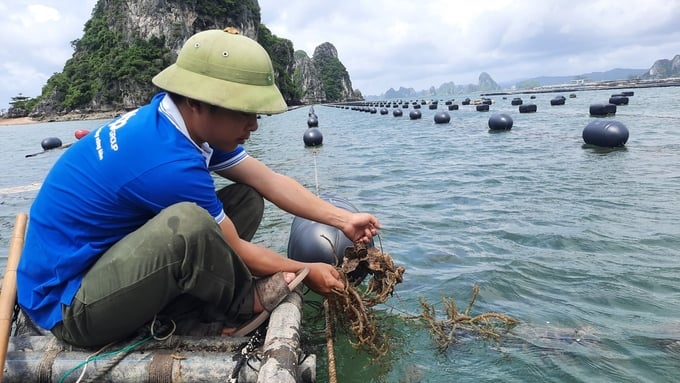
Oysters and elkhorn sea moss when intercropped will help each other grow well by making the water environment cleaner. Photo: Nguyen Thanh.
It is known that STP Group successfully tested the model of intercropping elkhorn sea moss with Pacific oysters in 2021. In the same year, Phat Co Cooperative cooperated with STP Group in implementing a production - consumption chain for these two agro-products. Now farmers can produce in peace and no longer have to worry about the output.
Currently 1 ha of Binh's oyster farm harvests more than 100 tons/year. As for the 4 ha elkhorn sea moss farm, the yield is 200 tons/year. The current selling price of oysters is VND 6,000 - 9,000/kg, while elkhorn sea moss is sold at VND 6,000/kg fresh, VND 55,000/kg dry. Thanks to this intercropping model, Binh earns over VND 2 billion per year.
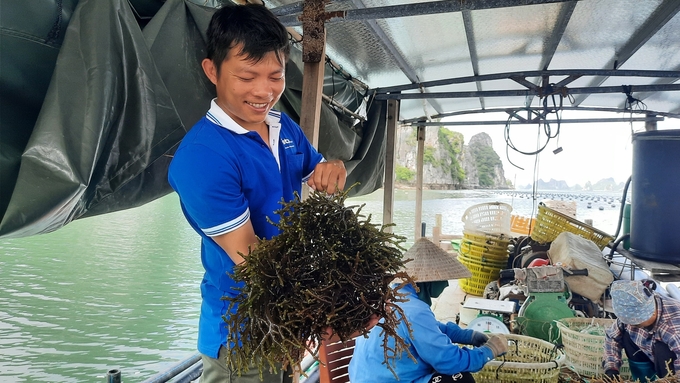
Elkhorn sea moss can be harvested after 70 days, 1 ha can produce 50 tons of fresh sea moss per year. Photo: Van Nguyen.
According to Do Dinh Minh, Director of Quang Ninh Sub-Department of Fisheries, the province will soon have a plan for aquaculture areas, including marine farming. It is estimated that each household will be allocated 1 ha of water surface area.
“Instead of just doing single-species culture and focusing mainly on the basic nutritional needs of that species, multi-layered farming can create a culture environment similar to a small natural ecosystem. For example, the combination of oyster and fish farming with clam, Pacific geoduck, sea cucumber and seaweeds forms a cluster close to each other, making each species a ‘live filter’ for the farming environment”.
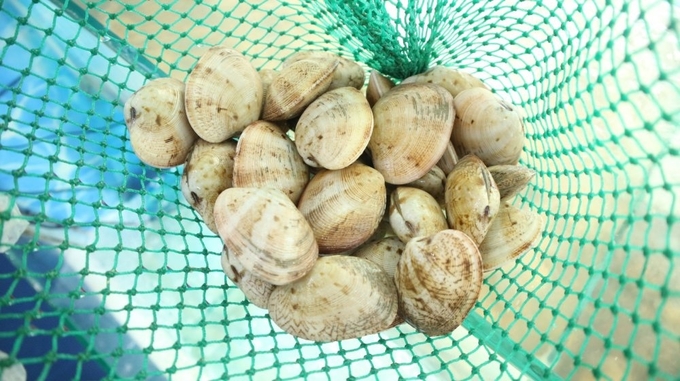
Tapes dorsatus (dual core white clam) is one of the molluscs that can be integrated into the multi-layered farming model in Quang Ninh. Photo: Nguyen Thanh.
Multi-layered farming allows the leftovers, waste, nutrients and by-products of one species to be recovered and converted as useful products, food and energy for the growth of other species. When implemented strategically, this farming method can diversify farm products and provide ecosystem benefits, such as improved environmental quality, additional income for farmers, and full exploitation of the allocated water surface area.
Director Minh said, “In 2014, oysters sold for VND 35,000/kg. This can be considered the heyday of oysters. However, the widespread, unplanned farming of oysters caused supply to exceed demand, leading to a reduction in value”.
Quang Ninh currently has 10,000 ha of oyster farming, but only 6,000 ha is in the farming area planning. Every year, the income from oyster farming is roughly VND 1,500 billion at the price of VND 6,000/kg.
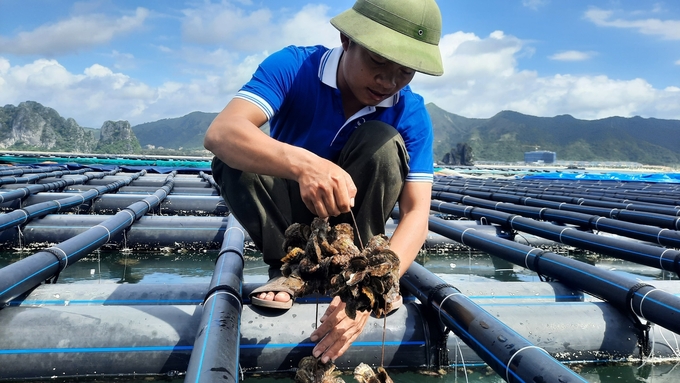
Using environment-friendly HDPE floating material is becoming more popular among oyster farmers in Quang Ninh. Photo: Nguyen Thanh.
“If we return to the VND 35,000/kg price rate, the revenue from oysters would be. But we hope to create a better environment for oysters to grow in the near future, after re-planning the farming area. The output of oysters may decrease, but the price will definitely be better, reaching VND 10,000 - 15,000/kg. When that time comes, the oyster will be able to create economic value, maybe 2-3 times more than the current period," said Director Minh.
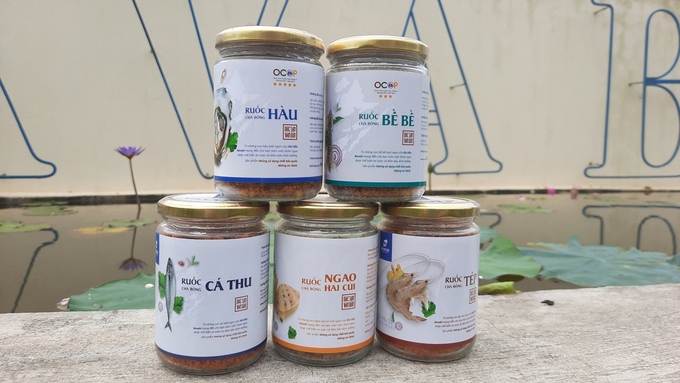
Deep-processed products from clams and oysters all achieve OCOP quality from 3 to 5 stars, consumed at home and abroad. Photo: Nguyen Thanh.
In addition to the potential for aquaculture development, Quang Ninh also has the advantage of having a border with China, one of the major powers in the production and consumption of fishery products, especially fresh seafood. Hong Kong, Taiwan, and Japan are also huge seafood consumption markets for Vietnam in general and Quang Ninh in particular.
One thing to note is that the domestic consumption market is not small, particularly since Quang Ninh is a destination where people from all over the world come to visit, and its fishery products have gained a fair amount of popularity in the past few years. From those potentials and advantages, mollusk farming is expected to bring in trillions of VND per year, contributing to the goal of making Vietnam’s fishery a billion-dollar industry.
Translated by Samuel Pham

(VAN) Facing the threat of rabies spreading to the community, Gia Lai province urgently carries out measures to vaccinate dogs and cats on a large scale.

(VAN) Disease-free livestock farming not only protects livestock herds but also stabilizes production and livelihoods for many farmers in Tuyen Quang.

(VAN) Japan's grant aid project contributes to capacity building, promoting organic agricultural production, and fostering sustainable community development in Dong Thap province.

(VAN) For years, the CRISPR-Cas9 genome technology has been reshaping genetic engineering, a precision tool to transform everything from agriculture to medicine.

(VAN) Vietnam aims to become a 'leader' in the region in the capacity and managing effectively soil health and crop nutrition.
![Reducing emissions from rice fields: [Part 1] Farming clean rice together](https://t.ex-cdn.com/nongnghiepmoitruong.vn/608w/files/news/2025/05/05/z6509661417740_a647202949c539012a959e841c03e1d3-nongnghiep-143611.jpg)
(VAN) Growing clean rice helps reduce environmental pollution while increasing income, allowing farmers to feel secure in production and remain committed to their fields for the long term.
/2025/05/19/5136-1-144800_230.jpg)
(VAN) The Nghe An Provincial People's Committee has just approved the list of beneficiaries eligible for revenue from the Emission Reductions Payment Agreement (ERPA) in the North Central region for the year 2025.